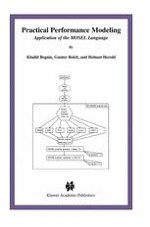Practical Performance Modeling: Application of the MOSEL Language introduces the new and powerful performance and reliability modeling language MOSEL (MOdeling, Specification and Evaluation Language), developed at the University of Erlangen, Germany.
MOSEL facilitates the performance and reliability modeling of a computer, communication, manufacturing or workflow management system in a very intuitive and simple way. The core of MOSEL consists of constructs to specify the possible states and state transitions of the system under consideration. This specification is very compact and easy to understand. With additional constructs, the interesting performance or reliability measures and graphical representations can be specified. With some experience, it is possible to write down the MOSEL description of a system immediately only by knowing the behavior of the system under study. There are no restrictions, unlike models using, for example, queueing networks, Petri nets or fault trees.
MOSEL fulfills all the requirements for a universal modeling language. It is high level, system-oriented, and usable. It is open and can be integrated with many tools. By providing compilers, which translate descriptions specified in MOSEL into the tool-specific languages, all previously implemented tools with their different methods and algorithms (including simulation) can be used.
Practical Performance Modeling: Application of the MOSEL Language provides an easy to understand but nevertheless complete introduction to system modeling using MOSEL and illustrates how easily MOSEL can be used for modeling real-life examples from the fields of computer, communication, and manufacturing systems.
Practical Performance Modeling: Application of the MOSEL Language will be of interest to professionals and students in the fields of performance and reliability modeling in computer science, communication, and manufacturing. It is also well suited as a textbook for university courses covering performance and reliability modeling with practical applications.
